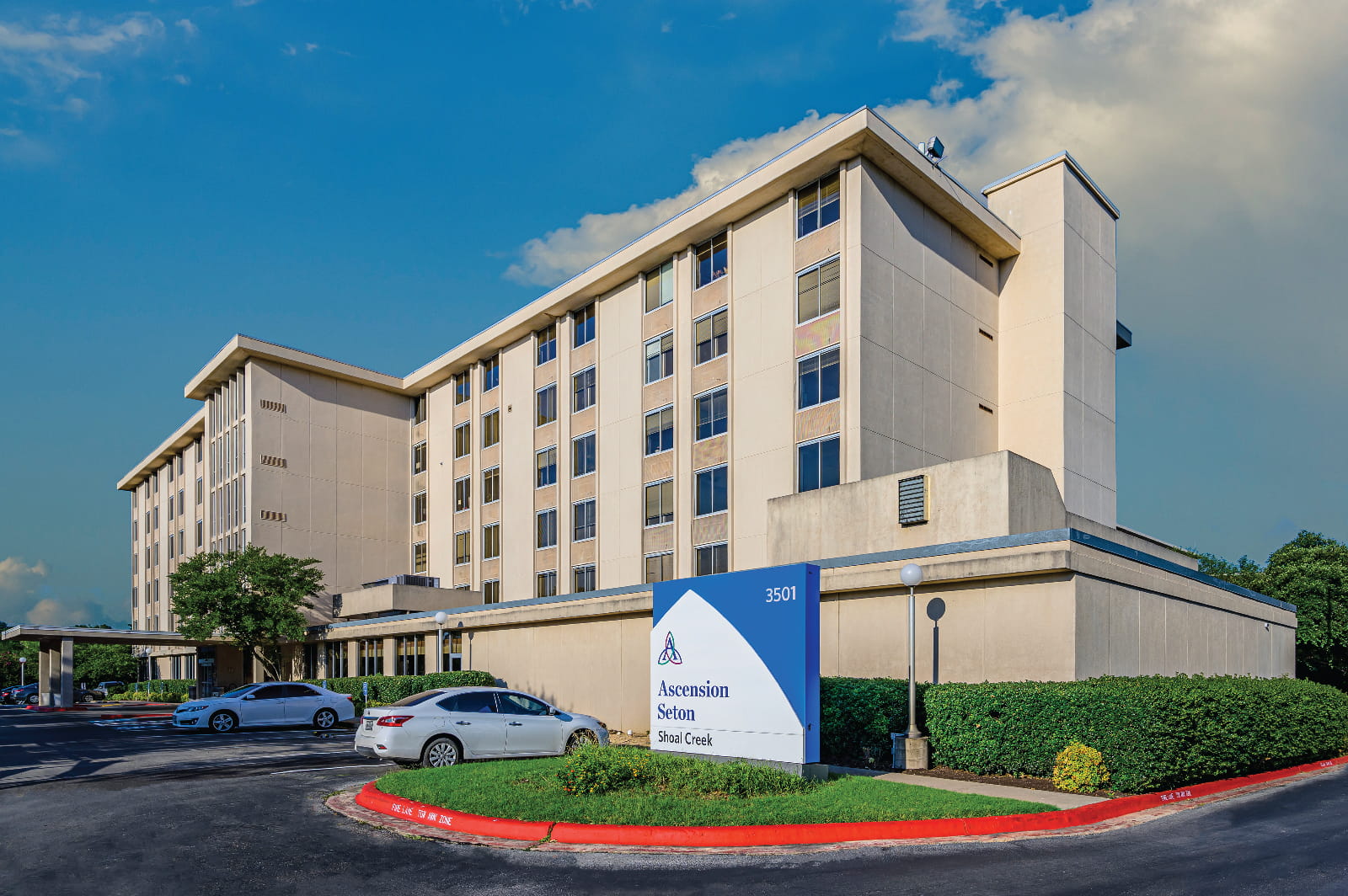
Ascension Seton Behavioral and Mental Health
Ascension Seton Behavioral and Mental Health
If you or a loved one is experiencing depression, anxiety, mood swings, difficulty with sobriety, or other emotional difficulties that are getting in the way of living a meaningful life, we encourage you to choose one of our adult outpatient programs.
For more information, or to schedule an assessment at no cost to you, please call to speak to one of our Resource Navigator clinicians at 512-324-2039.
Outpatient Programs for Adults
At Ascension Seton, we have adult outpatient programs that offer behavior and mental health services. Our programs address and include the following:
- Chemical dependency (CD)
- Dialectical Behavioral Therapy (DBT)
- DialecticalBehavioral Therapy for Substance Use Disorders (DBT-SUD)
- Dual mental health and substance use diagnosis recovery (DUAL)
- Electroconvulsive therapy (ECT)
- Mental health (AIOP)
- Radically Open DBT (RO DBT)
- Restore program for the treatment of Post-traumatic Stress Disorder (Restore)
Chemical Dependency Intensive Outpatient Program
The CDIOP program can help people:
- Reinforce 12-step core principles
- Learn how to identify and respond to relapse triggers
- Develop coping skills to improve personal well-being
- Understand addiction as a chronic disease
- Maintain abstinence and develop a sober support system
Dialectical Behavioral Therapy Intensive Outpatient Program
Dialectical behavioral therapy (DBT) is a skills-focused therapy that was developed to help people work toward building a sense of well-being in life by teaching skills to increase awareness of behavior patterns and effectively manage impulsive behaviors, intense emotions, and chaotic relationships that are interfering with their life goals. DBT has four core skill components: Mindfulness, Interpersonal Effectiveness, Emotion Regulation, and Distress tolerance.
Dialectical behavioral therapy has been found to be effective in helping people to manage the following:
- Anger
- Sadness and depression
- Urges to self-harm
- Thoughts of suicide
- Eating disorder symptoms
- Substance abuse
Dual Recovery Intensive Outpatient Programs
The Dual Recovery Intensive Outpatient Program (IOP) is designed to treat adults who experiencing psychiatric disorders that co-occur with substance abuse or dependence. In addition to our general Dual Diagnosis group, we offer a young adult dual diagnosis group for individuals ages 18-30.
The DRIOP program can help people:
- Reinforce principles of addiction recovery with emphasis on co-occurring psychiatric disorders
- Understand the role of biological and medical treatments in co-occurring disorders
- Overcome boundaries and stigma associated with addiction and mental illness
- Learn effective coping skills for co-occurring disorder
- Learn how to create a more balanced lifestyle to support recovery
- Encourage abstinence and development of a sober support system
Mental Health Intensive Outpatient Program
The Mental Health Intensive Outpatient Program (AIOP) is designed for adults with mental health symptoms that interfere with daily functioning and negatively impact quality-of-life. Adult IOP provides a structured and supportive therapeutic environment in which participants learn skills to enhance their lives.
The AIOP program can help patients:
- Recognize personal strengths and areas for growth
- Develop healthy coping skills
- Identify, challenge and modify unhealthy thoughts and beliefs
- Change unhealthy behavior patterns
- Problem solve and cope with emotional crises
- Improve communication skills and interpersonal boundaries
- Set immediate and long-term goals
- Develop an effective aftercare plan
Radically Open Dialectical Behavioral Therapy
Radically Open Dialectical Behavioral Therapy (RO DBT) is an evidence-based treatment developed to help people with disorders of overcontrol. Excessive self-control or overcontrol is a type of personality or coping style that can lead to behaviors such as perfectionism, obsessive rumination, and all or nothing thinking; difficulty with expressing emotions; avoidance behavior that leads to isolation or lack of daily structure; and difficult to treat mental health problems such as anxiety, depression and harsh self-judgments.
The RO DBT program can help people:
- Increase receptivity and openness to new experiences
- Increase flexibility in order to adapt to ever-changing environments
- Increase intimacy and social-connectedness
Restore Intensive Outpatient Program
The Restore Intensive Outpatient Programs (Restore IOP) are composed of evidence-based treatments and were developed to help people who have been impacted by a recent or past traumatic event, may be struggling to function due to fear, anxiety and other natural responses to trauma and may be experiencing symptoms of Post-Traumatic Stress Disorder (PTSD).
The Restore Program will retrain the mind and body to learn it is no longer in danger by incorporating the following treatment components:
- Cognitive Processing Therapy (CPT) is the primary treatment component of the Restore program. CPT is an evidenced based, time limited treatment which focuses on examining thoughts and challenging beliefs about what happened to support healing from trauma
- Trauma-Sensitive Yoga helps regain control of the body and its fight or flight responses
- Dialectical Behavioral Therapy (DBT) provides tools to cope with and tolerate difficult emotions
- Resilience training and community outings aim to renew the ability to discover positive changes after trauma and feel comfortable in the world again
For more information, or to schedule an assessment at no cost to you, please call to speak to one of our Resource Navigator clinicians at 512-324-2039.
Patient Resources
More information about our programs and patient intake forms are available below.
For crisis intervention, please go to:
Dell Seton Medical Center at the University of Texas
1500 Red River Street
Austin, Texas 78701
Psychiatric Emergency Services (PES)
Richard E. Hopkins Behavioral Health Building
1165 Airport Blvd., Second Floor
Austin, Texas 78702
For referrals please fax to 512-380-4251.
Have an Emergency?
In an emergency, please call 911 or go the closest emergency department.
